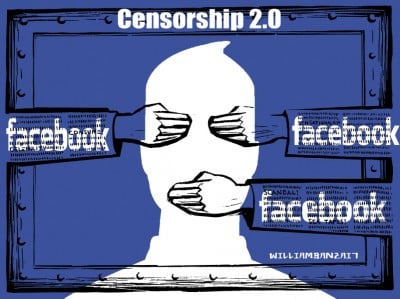Israeli Official Reports Increased Cooperation on Removing Content from Social Media
Israel’s Ministry of Justice requested thousands of posts be removed from Facebook, Twitter and other networks this year. 85% of the time, the requests were accepted

Social media services like Facebook and Twitter are increasingly likely to remove content from their networks upon request by Israeli Ministry of Justice officials, according to testimony by a government official at a parliamentary committee meeting on Monday.
The head of cyber unit at Israel’s State Attorney’s Office, Haim Wismonsky, reported to government ministers that 85% of government requests to remove content deemed harmful or dangerous were accepted in 2017, compared to 70% last year.
In 2016, the government requested the removal of 2250 posts or social media pages. This year’s total will not be available for another month, but
“the amount of content multiplied several-fold,” said Mr. Wismonsky. “There was an enormous spike.”
The parliamentary committee that heard Mr. Wismonsky convened in order to discuss a proposal for a law that would empower an administrative tribunal to order social media companies to remove certain types of content. Under the so-called “Facebook Law,” two conditions would have to be met for a tribunal to make such a ruling.
First, the court would have to deem the content criminal in nature. Then, the court would have to decide that it represents a threat to an individual, to public safety or to national security. The law would apply to all social media and also to Google search results.
Civil liberties groups have been criticizing the proposed law, saying that it would give too much power to an administrative tribunal in determining what constitutes a crime.
So far, the Ministry of Justice has focused on content by terrorist organizations and any posts that incite to violence and terror attacks, Mr. Wismonsky said. These types of posts “galvanize lone wolf attacks,” he said, referring to the phenomenon in recent years of stabbings and vehicle attacks carried out by individuals without affiliation to terrorist groups.
In the future, there will also be a focus on stemming the occurrence social media posts targeting victims of sexual violence.
Some companies have been more cooperative than others. It is easy to get Google and Facebook to act, Mr. Wismonsky said, adding that Twitter and WordPress are less likely to cooperate.
“A page explicitly associated with Hamas would be removed by Facebook, while Twitter would require a court order,” he said.
The proposed social media law could help resolve situations like this.
“There are cases in which we think something poses a threat, but the company says its user agreement has not been violated,” Mr. Wismonsky said. “That’s when we’ll want legal backing.”
The parliamentary committee’s chairman Nissan Slomiansky responded to Mr. Wisnosky’s findings, saying that it appears the government is powerless against companies that refuse to cooperate.
“I am not saying that we are going to control these companies but we cannot let them go completely unchecked,” said Mr. Slomiansky, a member of the Israeli parliament with the right-wing party The Jewish Home. “We have to agree that every entity obey the laws of the state where it operates.”

